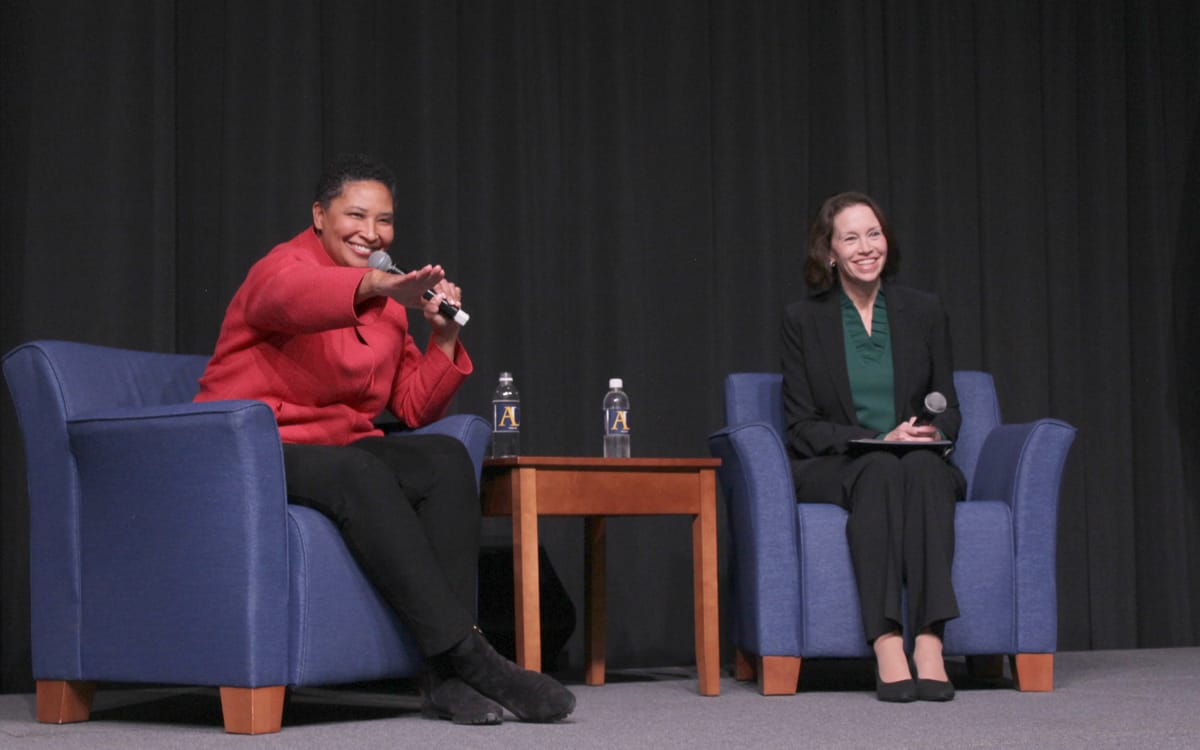Harvard professor encourages, teaches confident pluralism

When Danielle Allen, Harvard professor and director of the Allen Lab for Democracy Renovation, worked at the Washington Post during the 2016 election cycle, she often received hate mail, but worse, she also received pictures of nooses, easily interpreted as death threats.
Allen feared how she was losing trust in her fellow Americans and reached out to a colleague with social media expertise to find the source of the messages.
Shockingly, most came from Europe.
After learning that the most frightening and violent emails were not from her fellow citizens, Allen committed to responding to all emails with trust, civility and politeness to find the real people and weed out the fakes.
“No matter how nasty the incoming thing is that I get, I say, ‘Thank you for your kind message,’” Allen said. “To my astonishment, nine times out of ten, the person changes, and they walk away from the nastiness and are ready to engage in a human way.”
This method of civil engagement is at the heart of confident pluralism, which Allen promoted at Augustana’s second annual Critical Inquiry & Citizenship Colloquium.
Supported by Dean and Rosemarie Buntrock, the Colloquium aims to spark discussion about how to live in a pluralistic democratic society.
Allen sees confident pluralism as the answer and offered a five-step plan in her keynote address at the Elmen Center on Nov. 13.
1. Know what matters to you and why.
2. Commit to working through institutions and nonviolence.
3. Commit to compromise.
4. Listen and try to understand.
5. Hold sacred the human dignity of everyone you interact with.
“We need pluralism in order to address problems,” Allen said. “Confident pluralism is the how of how we do that work.”
After the speech, Allen fielded questions from the audience in a Q&A moderated by President Stephanie Herseth Sandlin. Topics ranged from how to be a confident pluralist when others are uncompromising to changes to capitalism to lift people out of poverty.
After the discussion, Allen stuck around to chat and sign books.
Allen’s engagement with the campus community didn’t stop there. She also attended many smaller meetings with faculty, Augustana Student Association members, Journey scholars and government and Civitas students.
Junior Joseph Gebel, a government and religion major, attended Allen’s keynote address and her meeting with government and Civitas students. Gebel said he especially enjoyed the small group talk with Dr. Allen, as he could dive deeper into her ideas through conversation.
“The big event was geared toward people who aren’t familiar with her work, and then the smaller event for just government students and civics majors,” Gebel said. “Everyone there was kind of expected to know who she was, to know what her stances were, so we were able to engage a bit more.”
Herseth Sandlin said these more intimate discussions focusing inward on the campus community set the Colloquium apart from the Boe Forum.
“We can bring someone in that [faculty] help identify and that you integrate dialogue before and after the speaker is here and that the speaker is here for more than a keynote,” Herseth Sandlin said.
When the call went out to faculty to suggest colloquium guests last fall, David Golemboski, associate professor of government and international affairs, thought Allen would be perfect for promoting civil discourse and “respectful democratic citizenship” after what he deemed was going to be a divisive election and submitted her for consideration.
“We figured she would be the person who, whatever the state of affairs, would be able to lend some kind of insight, wisdom and ultimately a call toward bringing out the best of our democratic processes,” Golemboski said.
Golemboski was impressed by Allen’s ability to communicate in different ways to different groups through personal stories in her keynote address, focusing on the role of the University in a talk with faculty and discussing leadership with ASA.
“She is just clearly a very brilliant person,” Golemboski said. “The way that she handles complex questions and is able to spin out really deep and profound thoughts in accessible terms on the fly is really remarkable.”
Golemboski hopes that future speakers will become more diverse. Both Allen and Michael Sandel, who spoke at the first colloquium, are Harvard University government professors.
“They’ve been fantastic, but I am looking forward to seeing how the Colloquium develops to bring people who are not necessarily scholars of politics, not necessarily scholars, but who are nevertheless equipped to speak to the themes of critical inquiry and citizenship,” Golemboski said.
Gebel also expressed a desire for a greater diversity of thought.
“I am kind of a chronic fence-sitter, and so I try very hard to be moderate and be nonpartisan and see things from multiple angles, and everyone we invite kind of speaks to that same belief, and it is not that I don’t agree, I just almost wish there were some beliefs that were brought to campus that were a little more challenging,” Gebel said.
The call for faculty to nominate speakers for next year has already gone out. Herseth Sandlin said the president’s council works with a small group of faculty to decide what guest is invited and how the event will be structured based on recommendations from faculty.



